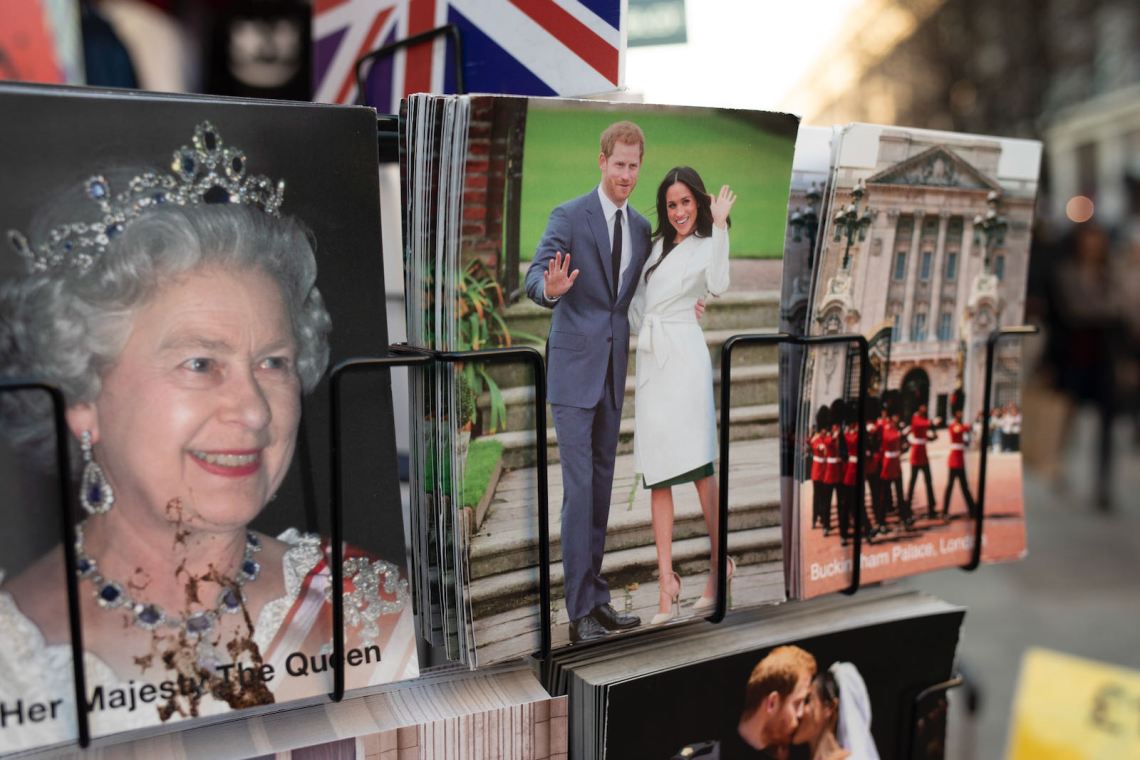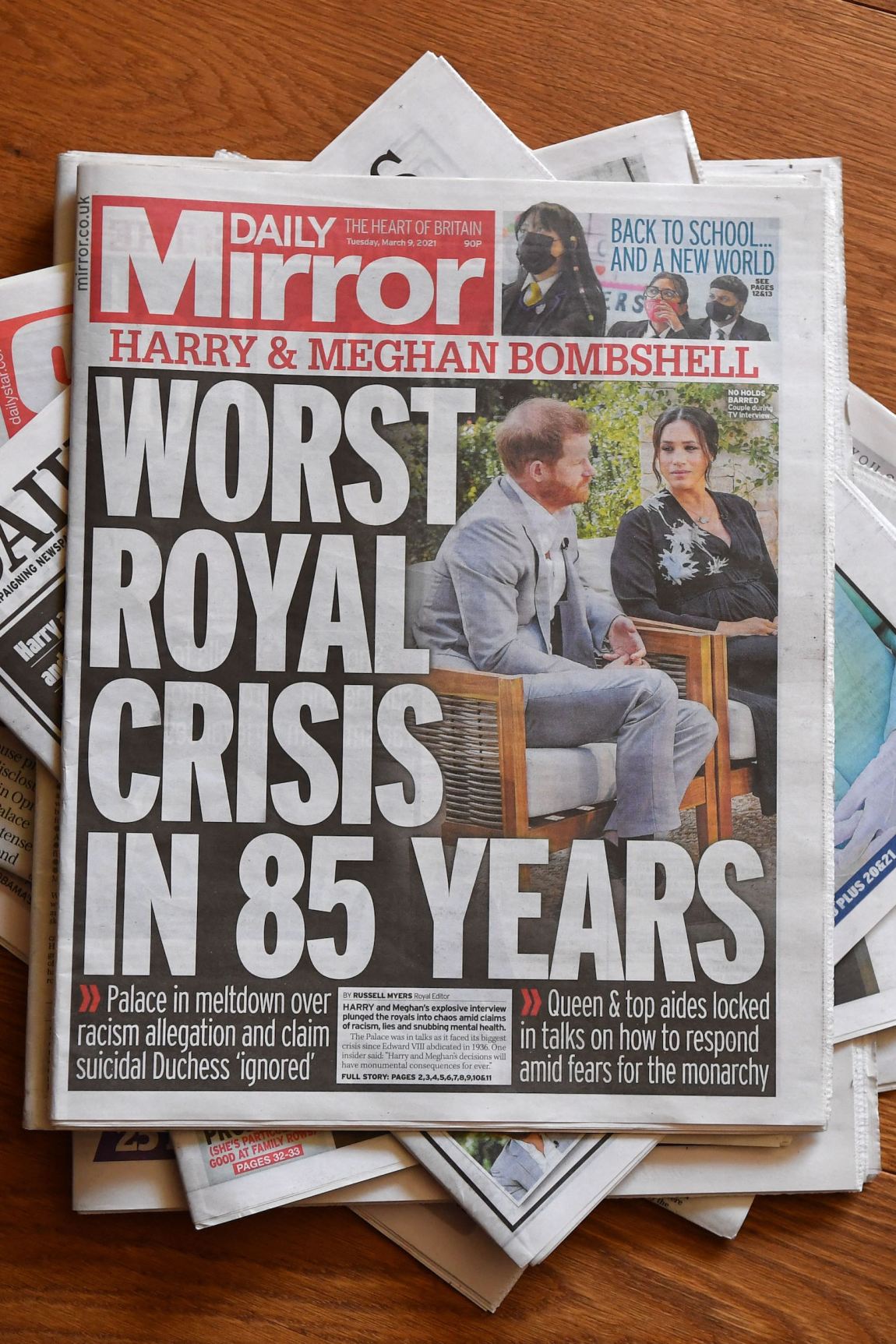Even by royal standards, the press and public relations broadside delivered by Harry and Meghan in their interview with Oprah Winfrey this past Sunday was impressive. This is praise, of a sort: for over a century now, the Windsors have been in a class of their own for providing spectacle, scandal, feud, tragedy, and disgrace—and doing very well out of it. So it takes some chutzpah to trump all that—even if, for many decades, the worst of the Firm’s snobbery, vindictiveness, and chicanery was carried on behind a veil of pageant and respectability held up by establishment deference and media compliance.
It has to hurt, though, when a prince (still sixth in line to the throne) and his consort go on the world’s biggest talk-show franchise and baldly call you racist. In 2021, is there enough ERII-branded livery to counter that shade?
Of course, Harry was following the playbook his mother, Princess Diana, developed—of cultivating media allies to counter the smears and spiteful briefing of the Firm’s formidable press operation. “My family literally cut me off financially,” he told Oprah. “I’ve got what my mum left me. Without that, we never would have been able to do this… I think she saw it coming.”
In that regard, too, the couple’s CBS appearance was simply an escalation, not a radical departure. It takes its place in the long, steady convergence of the Windsors with the Kardashians, or even, indeed, with the Trumps—all now broadly belonging to a common genre of celebrity-dynasty reality TV. And for all the show’s pseudo-revelations, this episode was a great deal less scandalous and shocking than the allegations laid against Ghislaine Maxwell and the late Jeffrey Epstein that they sex-trafficked a seventeen-year-old for Prince Andrew’s pleasure—an accusation only lent credence by his disastrous 2019 TV interview.
Where Meghan and Harry scored palpable hits, though, was in nailing down a sense of the Windsor family as aloof, superior, and chilly. Wittingly or otherwise, the Sussexes succeeded in claiming to be victims of the institutionally abusive culture of the court—a theme that aligns precisely with the through-line of the Netflix original The Crown, especially in the focus of later seasons on first Charles, then Diana. The early seasons’ interest in retelling some of the true political scandals—the Duke of Windsor’s treasonous plotting, Lord Mountbatten’s potential part in a coup—has given way to a more prime time-friendly study of adultery and emotional cruelty among the equine classes.
For its part, the British press greeted the Oprah appearance with a predictable blend of titillated schadenfreude and bad-faith indignation. The UK media’s cake is all the sweeter for having-and-eating-it-too because the warring royals story breaks the relentless grind of the endless pandemic reporting that followed Brexit fatigue.
So, for now, this latest show made a very good season finale to the storyline of the Sussexes’ alienation, and The Windsors soap opera still looks like solid box office. But no series runs forever: public tastes change, favorite actors/characters fall by the wayside, media markets look for new, younger audiences. So what if, at some point not so far off, the royals do not get recommissioned as value-for-money popular entertainment?
The British monarch is very unusual among royalty worldwide for having a constitutional role. And the monarch commands this position not only within the British state, but across the British Commonwealth, that polite vestige of empire. But if people—in the UK and beyond—should lose interest in the show because of the toxic tawdriness of it all (so opposed, after all, to the Firm’s official aura of courtly sophistication), what then? If the Windsors were no longer boffo, what would become of the British monarchy?
Every unhappy family is unhappy in its own way, but the royal family is especially unhappy in its unique way. And the author of War and Peace would hardly need telling that, for this kind of aristocratic family, the personal is supremely political—in world-historical ways. So, at what point does the “Enchanted Glass” of the British monarchy, as historian Tom Nairn called it, crack—and a disenchantment with the institution’s flaws set in?
Already, back in the 1980s, Nairn described the marketing of the Windsors as a “mass illusion of intimacy.” And this was a decade before Diana’s description of her royal marriage as an involuntary ménage à trois. No doubt, Nairn was thinking of the way the trinkets and street parties of the queen’s 1977 silver jubilee conjured a grotesque national-popular identification with the royal family that was wholly hallucinatory. For Nairn, the enchanted glass was like a magical mirror on the wall that told every Briton that their queen was the fairest of them all—and this mystificatory feudal-fantastical fealty obliterated any truer understanding of their place in Britain’s caste-like class society.
Advertisement
This critique of the absurdities of title and rank rings true to me. I am from Sussex, it is my county: Why are Harry and Meghan even the duke and duchess of it? I’m not their serf, or even their tenant. I did not elect them. What allegiance do I owe them? The French writer and political scientist Alexis de Tocqueville, in his observations on America, made a compelling distinction between aristocratic and democratic societies. His main reference points were the US and France, but he was not ignorant of Britain.
In De Tocqueville’s scheme, the monarchy undergirded the way in which Britain, after its brief seventeenth-century republic and subsequent royalist counterrevolution, regressed to an uneasy compromise between the aristocratic and the democratic. But, through the eras both of bourgeois hegemony and proletarian contention, always the aristocratic style predominated, thanks to a royalist consensus that enabled class conciliation beneath the social hierarchy it ordained. That is the Nairn thesis: Britain, never again a republic after its abortive pre-Enlightenment, Puritan experiment, has—in genuflecting to a monarch, defender no less of an established church—consented to the people’s democratic infantilization, and a permanent postponement of their more radical, egalitarian impulses.
In the twenty-first century, however, this long self-exile to the sclerotic daycare system of Britain’s aristocratic society topped by Buckingham Palace is coming to an end. Democratic adulthood beckons, and the coming of age does indeed begin with disenchantment: the bewitching magic of class, caste, court, and throne are dissolving. All that is solid melts into air—even the crown.
What Tom Nairn called “Ukania,” an imaginary kingdom of England, Wales, Scotland, and Northern Ireland, is coming apart. (His best-known earlier book was presciently titled The Break-Up of Britain.) Parts of it are hastening to embrace disunion, so far gone is the disenchantment of the Scots and the Irish. In the wake of Brexit, both realms are likely to consult their peoples in plebiscites in the near future—Scotland on whether to go independent, Northern Ireland on whether to unite with all Ireland.
It is true that the republican cause is a dead letter in England, commanding no more than roughly 10 percent of public opinion in polling surveys, and—pre-pandemic at least—many people’s livelihoods depended on the tourism industry based on Britain’s royal heritage. But Scotland and Northern Ireland do not need to avow republicanism to vote for democratic self-determination. What is the constitutional monarchy of Ukania if its realm shrinks to England and, reluctantly, restively, Wales—how far then does the royal writ run?
Not much beyond the Sussex coast, in fact. Among the Commonwealth countries, more former colonial subjects are moving to sever the ties that make the mother country’s monarch their head of state: Barbados did so last year; its Caribbean cousin Jamaica has signaled intent to do likewise.
Historical drift is turning into political momentum. Britain’s monarchy would need to come up with a very good reason for empire unionism, which today may be a letter even more dead in UK politics than outright republicanism. On the Oprah interview’s evidence, that doesn’t seem likely to be forthcoming. Once upon a time, the queen could have sent rebels to the Tower and the headsman’s block, even relatives—especially relatives. But reactionary, racist mean-spiritedness probably won’t cut it in this century.
Given the Brexit-related rise of English nationalism, that corner of Ukania will not soon abjure its royalist instincts. But for the other nations of the British Isles, the mask of monarchy has slipped, and the misrecognitions of the enchanted glass are falling away. The alternatives to England’s creaking constitutional compromise are newly available and apparent. It may be worth recalling that the British national anthem, “God Save the Queen”—as emphatic an endorsement of the aristocratic view as one might wish to find—has a democratic counterpart to the self-same tune: “My Country, ’Tis of Thee.”




